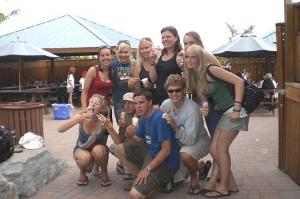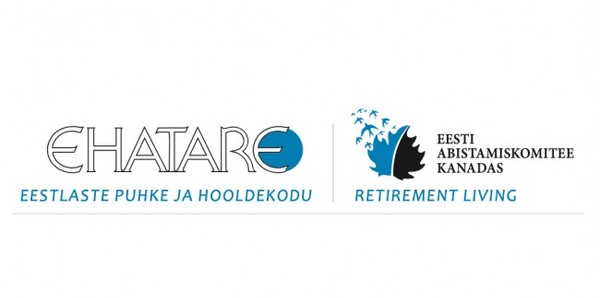We are now planning our 56th Estonian heritage summer camp program and this year, every week at Jõekääru will be an opportunity for children to practice and develop their Estonian language skills. With an advanced immersion program including instruction in Estonian and instructors and counselors from Estonia, children of all language levels, will benefit from a truly inclusive and Estonian-rich heritage program. With the desire to strengthen our culture we are committed to an Estonian speaking camp and have added extra provisions (like dedicated Immersion staff) to enable all children to learn Estonian. By sending your child to Jõekääru, your child will benefit from being immersed in the language through daily routines, music, sports, arts, Estonian culture and long-lasting Estonian friendships.
Jõekääru creates an active and exciting Estonian summer camp environment by continuously adding value to our programming, resources and facilities. Jõekääru is a place where children have so much fun they don’t ever want to leave! Be a part of this Estonian legacy and help us foster future generations of Estonian-speaking children by sending your kids to Jõekääru this summer!
For more information visit our website at www.joekaaru.ca

Join us at Jõekääru! (16)
Archived Articles | 06 Mar 2009 | Eesti Elu
Viimased kommentaarid
Kommentaarid on kirjutatud EWR lugejate poolt. Nende sisu ei pruugi ühtida EWR toimetuse seisukohtadega.
The camp goes out of it's way to accommodate both those who want an Estonian-only camp and those who want an English and they get critizised? Keep up the good work Jõekääru!
As an outsider, i.e., not from Ontario, it doesn't seem like a question of snobbery, but rather a question of what one's goals and motivations are for attending camp. Is it to form friendships with others of Estonian heritage while speaking English or is it to form friendships with others of Estonian heritage while also having the opportunity to practice one's Estonian.
Kate, this issue has come up time after time after time after time...
There is no easy solution.
As one commentator said, they worked hard at teaching their children Estonian and needed a venue for the child to practice it.
This is true for so many of my peers. It worked. Our kids speak the language at a functional (and some even better) level. … but what happened to their peers who did not speak the language? From what I’ve heard, many didn’t feel welcome and left the community.
As another commentator said, there is a huge area of grey, as far as language skills are concerned. This is totally natural, since we are now raising the second and even third generation of Estonians born abroad.
Our community as a whole is recognizing the wide spectrum of needs to keep this very fragile community vibrant and relevant. We need EVERY person of Estonian heritage to feel Estonian and to feel that they belong.
Jõekääru, the object of this discussion, has, in my opinion, done a great job in juggling the needs of the community and families.
The more a child is exposed to the language, culture and community, the more apt they are to pick up the language and feel like a total participant in our “village”.
If a child hasn’t had the opportunity to learn the language as a young child, they probably won’t even want to learn it when they get older, unless they become motivated to do so.
The trick then is to facilitate opportunities for these youngsters to become motivated to learn.
We are fortunate these days to have so many opportunities available to us. Here are some suggestions for children, youth and young adults:
Lasteaed (kindergarden) is offering a parent and tots program for the second year already, where parents (or grandparents, aunts, uncles, friends) may bring their toddlers to interact with other Estonian children and their parents. They participate in singing classes and informal play. They hear the language at the vital time in their development, when language is acquired. EXCELLENT new program!
Lasteaed (Saturdays) – classes for kids 3 – 7 who speak Estonian or who don’t yet speak it.
Täienduskool (Tuesday nights)– classes for kids 7 – 13 who speak Estonian or who don’t yet speak it.
Adult and teen classes for beginners & advanced (Tuesday nights)
Keskkool / Gümnaasium (Monday nights)– classes for graduates of Täienduskool
Esto 101 (beginners) & Esto 202 (advanced) (Monday nights, with the kk & g classes, with weekly folkdance and singing classes with the rest of the school) teens ages 13 – 18
Jõekääru & Seedrioru summer camps which children may attend for one week or many.
Guides & Scouts – weekly meetings, winter weekend camps and summer camps (one week)
In the past couple of years, the government of Estonia has been very proactive in encouraging young Estonians abroad to come to Estonia in the summer and attend language camps there. They offer scholarships for this. Info can be found here:
http://www.archimedes.ee/amk/i...
(The info is in Estonian. If you need help with this, please ask)
Sororities and Fraternities (for University students & grads) – there are many to choose from and they offer a whole new group of peers to get to know and develop lifelong connections with.
The National Estonian Foundation in Canada (Sihtkapital) has become very proactive in promoting Estonian activities for all ages in all areas of Canada. They put out a monthly newsletter of upcoming events: http://www.estonianfoundation....
One of their mandates is to encourage youth to participate in their heritage community.
Opportunities are available and plenty.
We will always need those among us who speak the language but we also need each and every person of Estonian heritage to feel proud of being Estonian.
There are only 1.1 million Estonians in the world.
Let’s not fight about this issue any longer and let’s work together to create a positive, inclusive society.
There is no easy solution.
As one commentator said, they worked hard at teaching their children Estonian and needed a venue for the child to practice it.
This is true for so many of my peers. It worked. Our kids speak the language at a functional (and some even better) level. … but what happened to their peers who did not speak the language? From what I’ve heard, many didn’t feel welcome and left the community.
As another commentator said, there is a huge area of grey, as far as language skills are concerned. This is totally natural, since we are now raising the second and even third generation of Estonians born abroad.
Our community as a whole is recognizing the wide spectrum of needs to keep this very fragile community vibrant and relevant. We need EVERY person of Estonian heritage to feel Estonian and to feel that they belong.
Jõekääru, the object of this discussion, has, in my opinion, done a great job in juggling the needs of the community and families.
The more a child is exposed to the language, culture and community, the more apt they are to pick up the language and feel like a total participant in our “village”.
If a child hasn’t had the opportunity to learn the language as a young child, they probably won’t even want to learn it when they get older, unless they become motivated to do so.
The trick then is to facilitate opportunities for these youngsters to become motivated to learn.
We are fortunate these days to have so many opportunities available to us. Here are some suggestions for children, youth and young adults:
Lasteaed (kindergarden) is offering a parent and tots program for the second year already, where parents (or grandparents, aunts, uncles, friends) may bring their toddlers to interact with other Estonian children and their parents. They participate in singing classes and informal play. They hear the language at the vital time in their development, when language is acquired. EXCELLENT new program!
Lasteaed (Saturdays) – classes for kids 3 – 7 who speak Estonian or who don’t yet speak it.
Täienduskool (Tuesday nights)– classes for kids 7 – 13 who speak Estonian or who don’t yet speak it.
Adult and teen classes for beginners & advanced (Tuesday nights)
Keskkool / Gümnaasium (Monday nights)– classes for graduates of Täienduskool
Esto 101 (beginners) & Esto 202 (advanced) (Monday nights, with the kk & g classes, with weekly folkdance and singing classes with the rest of the school) teens ages 13 – 18
Jõekääru & Seedrioru summer camps which children may attend for one week or many.
Guides & Scouts – weekly meetings, winter weekend camps and summer camps (one week)
In the past couple of years, the government of Estonia has been very proactive in encouraging young Estonians abroad to come to Estonia in the summer and attend language camps there. They offer scholarships for this. Info can be found here:
http://www.archimedes.ee/amk/i...
(The info is in Estonian. If you need help with this, please ask)
Sororities and Fraternities (for University students & grads) – there are many to choose from and they offer a whole new group of peers to get to know and develop lifelong connections with.
The National Estonian Foundation in Canada (Sihtkapital) has become very proactive in promoting Estonian activities for all ages in all areas of Canada. They put out a monthly newsletter of upcoming events: http://www.estonianfoundation....
One of their mandates is to encourage youth to participate in their heritage community.
Opportunities are available and plenty.
We will always need those among us who speak the language but we also need each and every person of Estonian heritage to feel proud of being Estonian.
There are only 1.1 million Estonians in the world.
Let’s not fight about this issue any longer and let’s work together to create a positive, inclusive society.
Archived Articles
TRENDING



















